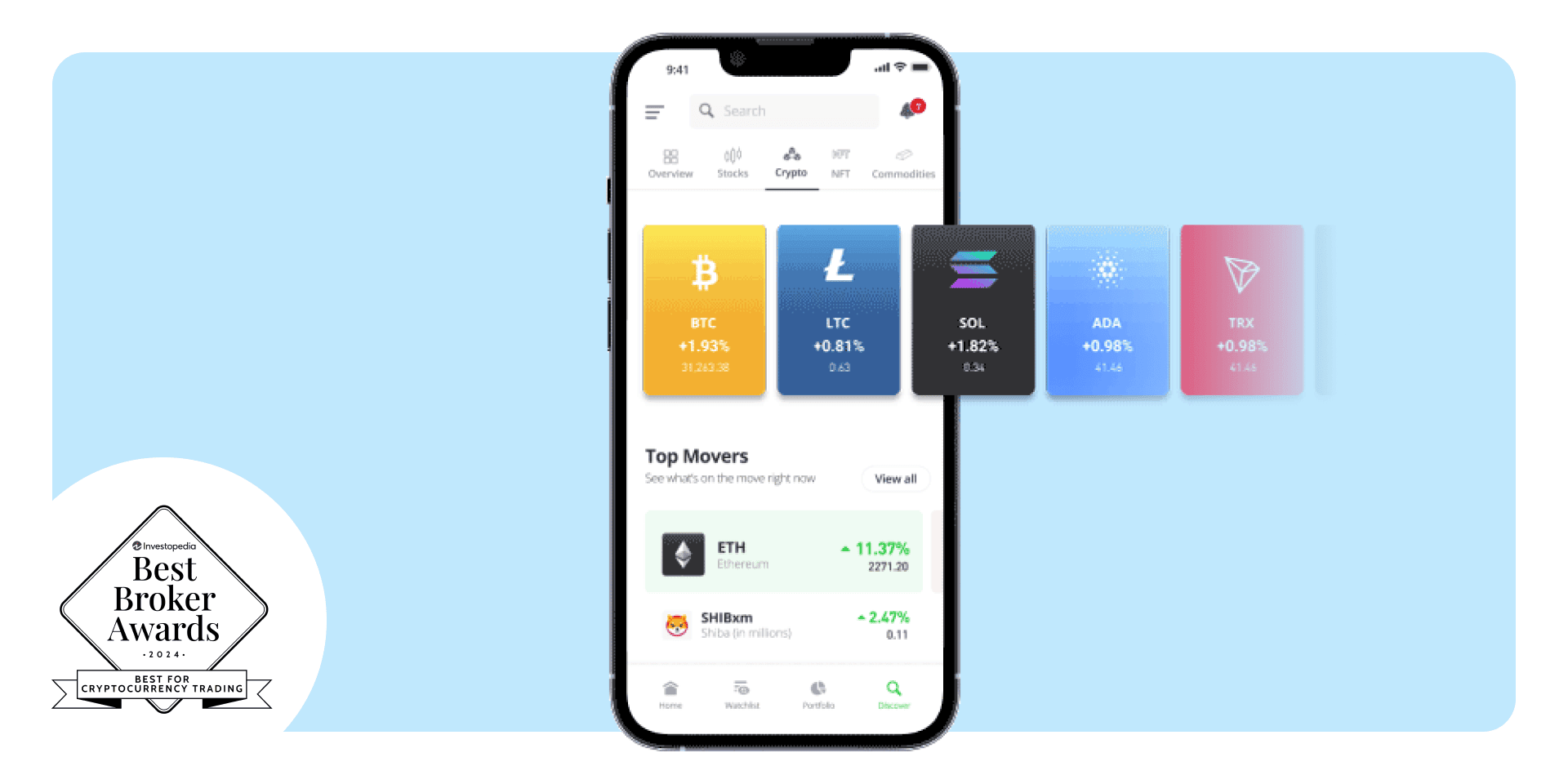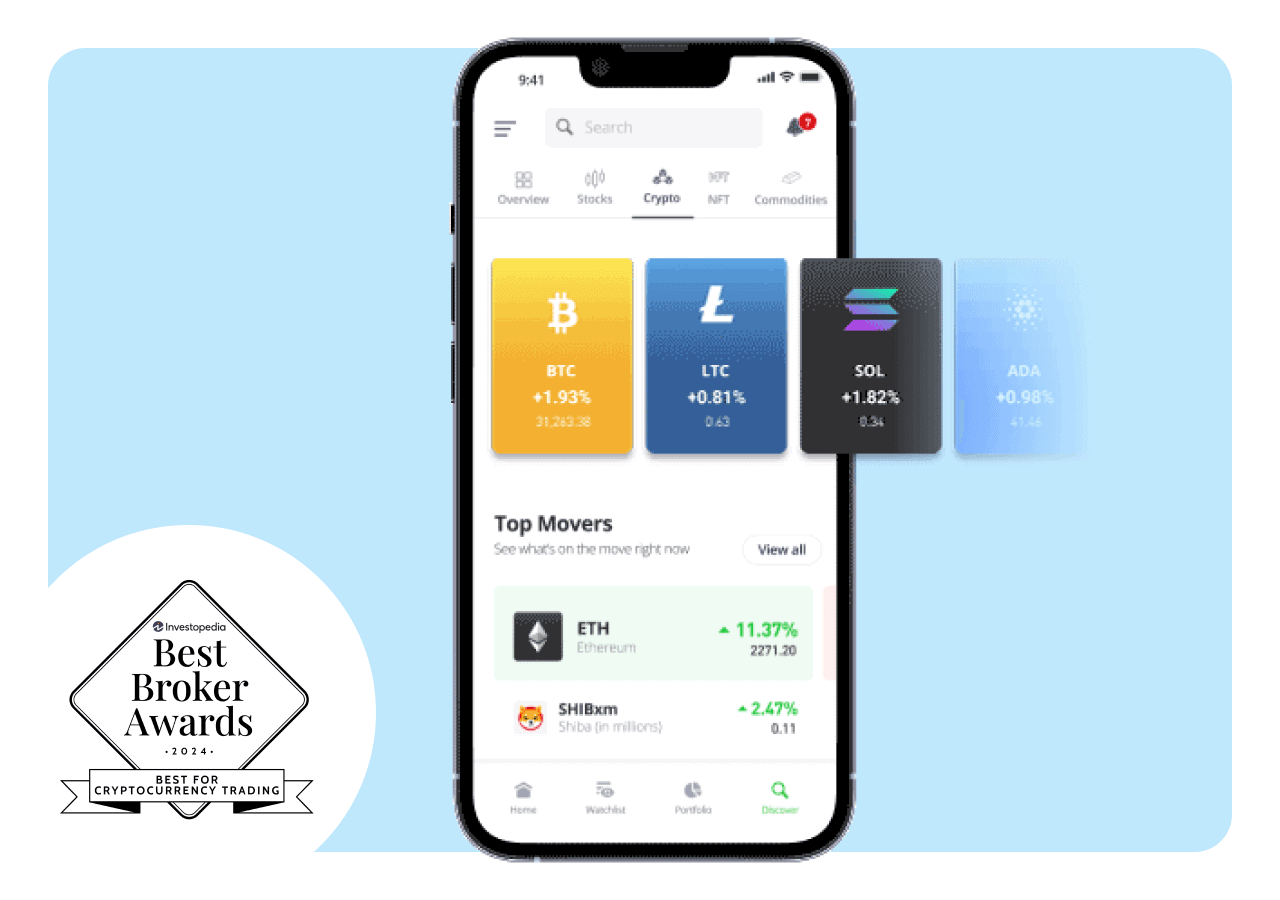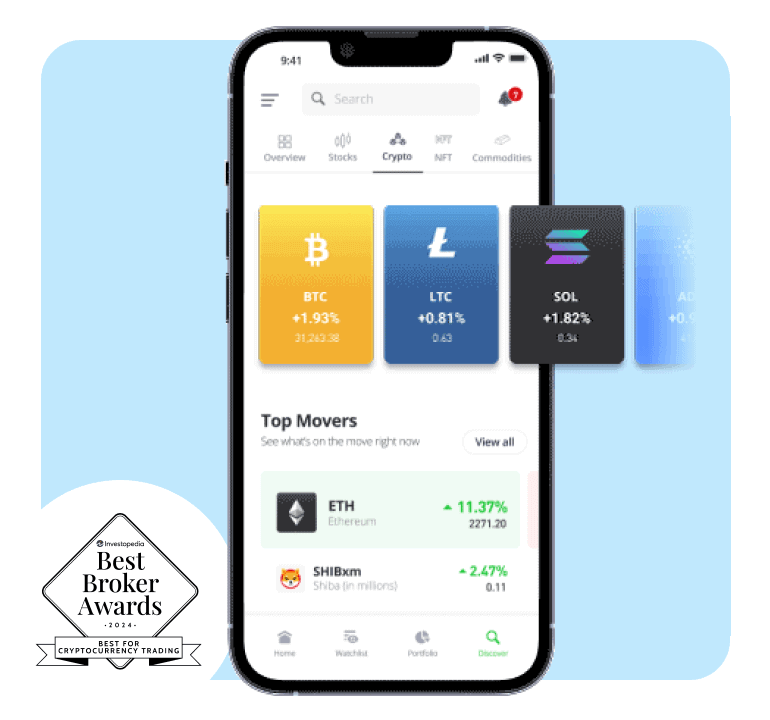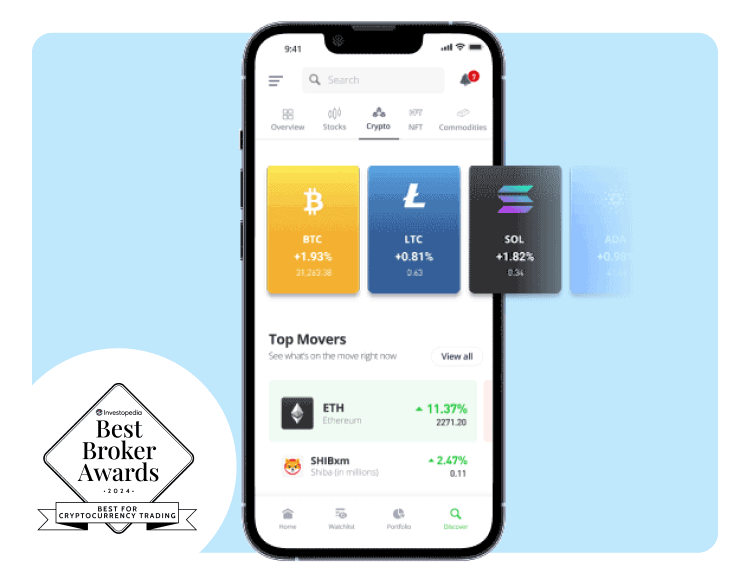Your crypto, your opportunities on eToro
From trading to reinvesting, manage your crypto on a single trusted global platform.




Why invest in crypto on eToro?

Learn from and copy other investors

Rely on a brand chosen by millions

User-friendly platform with no hidden costs
Popular cryptoassets
Discover the benefits of investing in any of the 100 vetted cryptoassets on a secure platform
A safe community space to grow your crypto
Feel among friends in our 30 million-strong community — get new insights, ask questions, and copy other traders’ portfolios. Invest in crypto on a reliable platform with a track record of well over a decade. Your cryptoassets are safeguarded with advanced security and free military-grade offline (“cold”) storage.
Copy Trading does not amount to investment advice. The value of your investments may go up or down. Your capital is at risk.


Everything at your fingertips
Eliminate the need for multiple platforms. You can build your ultimate crypto portfolio, then diversify with multiple assets and ready-made Smart Portfolios. Crypto in your eToro portfolio can accrue generous crypto staking rewards*, or be seamlessly transferred to the eToro Money crypto wallet at any time.
*Important note: Staking services are not available in the UK.
Trade with your crypto on eToro
Trade 100+ cryptoassets on a trusted global multi-asset broker, with powerful tools, user-friendly features, and industry-leading security protocols—all with transparent, fixed fees.
Your crypto, your choice. Take it further with eToro.
Learn crypto before you buy crypto
The eToro Academy is a totally free resource to help you upgrade your skills and make better trading decisions. Then practise what you learn risk-free in the virtual portfolio.

eToro Academy: The Knowledge to Trade
Your one-stop resource for learning to master the markets. It’s all here in one place, and all for free!
FAQ
- What is cryptocurrency?
-
Cryptocurrency is a way to trade currency and other assets digitally, independent of any third-party entity, such as a government or bank. These transactions take place on a decentralised ledger system called the blockchain. The first crypto was Bitcoin, and it remains a leading digital currency, along with Ethereum, XRP, and others.
- What is a blockchain?
-
A blockchain is a decentralised digital ledger where encrypted data can be transferred securely, making it nearly impossible to duplicate or counterfeit. This ledger is the foundation of any cryptocurrency transaction.
Read more about how the blockchain works here.
- What is staking?
-
Staking is a process that allows rewards to be earned by holders of a specific coin.
Staking derives from the PoS (Proof-of-stake) mechanism, used by a distributed blockchain network, where blockchain miners can mine or validate block transactions according to how many coins they have. The more coins they hold, the more mining power they have. Staking rewards are shared with users who own the cryptoassets (like eToro and our clients) and who delegate their voting rights to staking pools. The more validations that are delegated to a staking pool, the higher chance of being elected to produce the next block, and the more rewards likely to be received.
- How do I trade cryptocurrency?
-
Cryptocurrencies can be traded in two ways. Either you purchase the actual tokens and trade them on a cryptocurrency platform, or you trade derivatives based on the underlying cryptocurrency price. Depending on local regulations in your country of residence, you can do one or both on the eToro platform.
Read more about how to buy cryptocurrencies here.
- Which cryptocurrencies can I trade on the eToro platform?
-
eToro offers a wide variety of the world’s most popular cryptocurrencies and is constantly making more coins available for trading. Our current offering includes:
Bitcoin (BTC): The largest cryptocurrency by market cap, considered to be the first wide-scale implementation of blockchain technology.
XRP by Ripple Labs (XRP): This popular cryptocurrency enables real-time payments with greater transaction speeds and lower costs, and is already in use by many well-known brands.
Ethereum (ETH): This leading cryptocurrency has received international recognition from technology giants such as Microsoft and Intel. In addition to payments, Ethereum also supports “smart contracts.”
Bitcoin Cash (BCH): A ‘hard fork’ designed to be a solution to the transaction backlog Bitcoin was experiencing, Bitcoin Cash’s block size is eight times that of Bitcoin.
Ethereum Classic (ETC): Although Ethereum Classic has a significantly lower market cap than its namesake, it is still a popular cryptocurrency.
Litecoin (LTC): The first cryptocurrency to implement SegWit, a method of speeding up transaction times without compromising the underlying blockchain technology.
Dash (DASH): Based on Bitcoin’s technology, Dash’s additional infrastructure enables faster transactions and higher liquidity, though unlike other cryptocurrencies, Dash is a decentralised autonomous organization (DAO).
Stellar Lumens (XLM): Operating on a unique consensus algorithm rather than mining, Stellar can facilitate transactions between multiple currencies, whether fiat or digital.
NEO (NEO): Also known as the ‘Chinese Ethereum,’ NEO was designed to be easily modified and to have no forking ability.
EOS (EOS): Upon its release, EOS quickly became one of the top ten cryptos, with a powerful open-source infrastructure capable of supporting thousands of commercial-scale decentralised applications (DApps).
Cardano (ADA): Inspired by Ethereum, Cardano differentiated itself with a dual-layer structure running each layer separately, as opposed to Ethereum, where both layers are intertwined.
IOTA (MIOTA): Based on a proprietary ‘blockless’ blockchain called Tangle, IOTA is paving the way for a decentralised network to power the Internet of Things (IoT).
Zcash (ZEC): Zcash encrypts the contents of shielded transactions, ensuring that the sender, recipient, and amount transferred are all kept private.
TRON (TRX): Tron aims to create a decentralised alternative for digital content distribution via one of the largest blockchain-based operating systems in the world.
Tezos (XTZ): Tezos’ ICO in September 2018 was one of the largest in crypto history, raising a record-breaking $232 million.
Binance Coin (BNB): BNB is a utility cryptocurrency allowing users to unlock discounts on exchange fees for transactions made on the Binance exchange.
Compound (COMP): This decentralized finance (DeFi) protocol runs directly on the Ethereum blockchain enabling users to access various financial services such as borrowing and lending, while rewarding them with COMP tokens.
Chainlink (LINK): This tradable token is used to pay for transactions on the Chainlink network, a decentralized platform which enables smart contract agreements between oracles, or outside data sources, and the blockchain.
Uniswap (UNI): A decentralized, open-source crypto exchange which runs on the Ethereum blockchain, Uniswap utilises a user-based pool of liquidity providers, or automated liquidity protocol, to solve liquidity problems which most centralized exchanges suffer from.
Yearn.finance (YFI): A unique decentralized finance (DeFi) network providing staking pools, lender aggregation, yield generation and insurance on the Ethereum blockchain.
Dogecoin (DOGE): Originally created as a satire, but quickly gaining popularity on social media, Dogecoin is named for an internet meme featuring a Shiba Inu dog.
Aave (AAVE): Like other DeFi applications built on the Ethereum network, Aave uses smart contracts to facilitate decentralized lending services.
Algorand (ALGO): This open-source, decentralized blockchain network features exceptional speed and a unique Proof-of-Stake (PoS) consensus mechanism which rewards all ALGO coin holders.
Decentraland (MANA): Powered by Ethereum, Decentraland is a decentralized virtual reality gaming platform where users can buy, sell and otherwise monetize virtual plots of land as fully owned non-fungible tokens (NFTs).
Basic Attention Token (BAT): A utility token created for digital advertising transactions on the privacy-focused Brave browser, using the Ethereum blockchain.
Polygon (MATIC): This open-source protocol aims to be a hub for connecting compatible blockchain networks to the Ethereum network, leveraging its security and speed, via smart contracts.
Spark (FLR): The native token of the Flare network, designed to offer Ripple’s XRP Ledger, as well as other blockchains, and smart contract functionality, which they do not natively support.
Maker (MKR): An Ethereum-based smart contract platform that functions as a framework for both the DAI stablecoin and the MKR token.
Enjin (ENJ): This blockchain-based gaming platform uses virtual worlds to create an Ethereum token-based ecosystem and directly back the value of non-fungible tokens (NFTs).
Shiba (SHIBxM): Designed to support a fan-favourite dog breed, this meme-based crypto is offered on eToro as SHIBxM, which represents one million Shiba units.See the full selection of cryptoassets, including crypto crosses, here.
- How do I transfer coins from the eToro trading platform to my eToro Wallet?
-
You can easily transfer cryptocurrency from your portfolio to the eToro Wallet. Go to the Portfolio screen on the platform and click on the relevant open position. The option to transfer will appear in the ‘Edit Trade’ screen under ‘Invested amount.’ A pop-up window will appear showing the amount of units in the trade, the fee for executing this transaction, and the final amount of units (coins) that you will receive in your wallet.
For more detailed information, click here.



